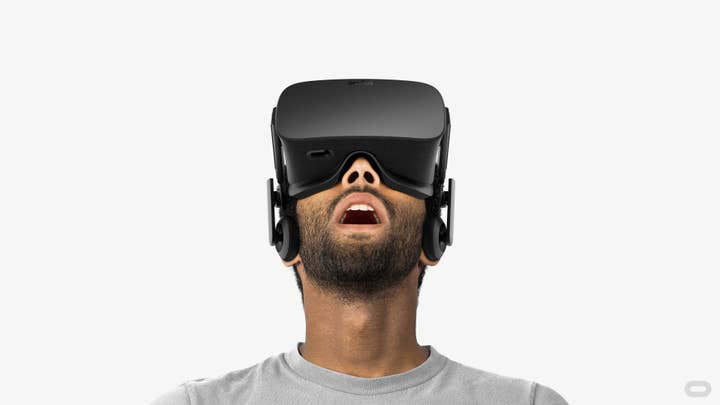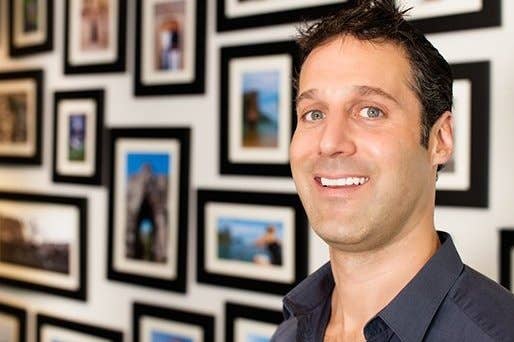Oculus and Jason Rubin: We're re-learning the language of game making
From Crash Bandicoot to the cutting edge of virtual reality
Jason Rubin was a star hire for Oculus VR last June, bringing a wealth of top-level games experience to Facebook's acquisition. He founded Naughty Dog, created and sold Flektor and even managed to give a dying THQ dignity in its final months and now, he told GamesIndustry.biz, working in virtual reality is making him feel 20 years old again.
As head of worldwide studios, Rubin oversees first and second party studios as they create the games and applications that will define the launch of the Rift headset. No pressure then. Rubin, however, is clearly thriving on the challenge. Here, he shares his insights into the challenges developers face, the potential for the system and why you should get on board now.
"I had two thoughts which were exactly opposite of each other. I thought one or the other would pan out. The first was that the scientists kept saying you couldn't do any camera movement whatsoever. You had to stick to very strict rules otherwise people wouldn't be comfortable. That was going to be a challenge.
"The other side of the coin was my game development background which said 'We'll figure out a way to get around all this. There's got to be some trick.' What it's turned out to be is a mixture of both of them. You really do have to respect the science, but around the science you can bend the edges a lot. I gave the example of the sniper rifle. Scientists told me you can't zoom in, well you can. They say that you can't move a camera quickly. We do it in hockey, no one notices because your feeling of impact. If we do that over a longer period of time, people won't like it. It really accentuates what we're doing.
"You really do have to respect the science, but around the science you can bend the edges a lot"
"We're kind of re-learning the language of game making. Just like when you're given a video camera the first time, or a movie camera. Then the assistant disappears and they stop the camera and everyone went 'whoop.' We're at that moment with VR right now. Everything's incredibly cool and interesting, but we're going to have to get to the point where we actually can make real movies. We actually can make real stories, and we can actually make real games that are compelling. Getting there is going to be re-learning that language. It's going to be a balance of respecting the science and testing."
"The QA process and the testing process for the most part are very similar if you're making games. Because games are games, you can break them in the same way as you used to. The comfort testing process is new and different. That requires a certain rigour and a certain acceptance of the data above instinct. That's been a little hard for some of our developers to come to grips with.
"For example, as a game maker, you get told 'that won't be fun'. There were times where I was told that making the games I was making where I said 'To hell with your data, I'm an artist. People will love it.' More often than not I was right. Sometimes I was wrong, but more often than not I was right. Going against the data in comfort is not the same. The data rules. So getting our developers to respect the data in that sense has been slightly different. Once they get past that, it's just another process of testing. Is this comfortable? No. Don't do it, come up with a different solution."

"I think we as a company believe in comfort. That comes from our CEO, that comes from Facebook as well. We want to create a comfortable experience. So we are focusing on comfort. Where we go in the long run, is going to be an interesting question. Out of the gate, we're going to focus on comfort. I also think that technology will improve. That helps a lot. We're at ninety frames a second right now. It's better if we're at one hundred and twenty, it's better if we're at two hundred and forty. We have certain types of screens, it's better if we have different types of screens. The technology is know, we know how to take the next comfort step in terms of the tech. It just takes a while to get there price point wise. So technology will get better.
"Development technology will get better. Developers will understand what they can do and what they can't do. They'll just get that. Then acclimatization will also be in existence. Exactly the same function happened in first person shooters. John Carmack works at Oculus. When he started working on his first first-person shooter, it wasn't 3D. That was Wolfenstein. His second one Doom we can argue about whether it's 3D, but it made a lot of people uncomfortable. There were articles written at the time how first-person shooters would never work. Now if you play a Call of Duty game, they're shaking you, you see your hands, you jump across the hood of a car, your feet come up on screen, and they're doing all these absolutely insane things. It totally works for the vast majority of people. That's development technology.
"So we have tech for the hardware. We have software tech, and then there's acclimatization. Between those three things I'm pretty confident that VR is going to be very broad."
"It is the biggest challenge VR has. Putting one on everyone's head"
"Part of it is that. It takes a long time to create something compelling. We haven't had a long time to do develop. Oculus went on a journey from barely acceptable technology, to what I now think is very comfortable acceptable technology to launch. In that time frame we went across, for example, DK1 our first development kit. It was great for development, but was not a consumer product. We did not launch it to the public. You know after a little while you're like 'I'm done with it.' Is not ever launch-able. But if you extrapolate from that experience and don't know where the future is going, you might say something along the lines of 'I can only be in VR for so long.' I think that became a meme out of that period.
"People who are now trying VR in the day and age of Rift are having no problem and aren't saying that. Again, it depends on the experience. I can only take a roller coaster for so long. I'm not going to be on a half hour roller coaster ride. You're good for three to five minutes, right? So it depends on the experience you're doing. Again, when it comes to things like Toy Box, I believe people will be in there for longer sessions. I think the long term VR potential, once you get past the current technology to what we know is coming, is going to be much longer sessions."
"It doesn't matter what it will cost. If it costs too much this week it will cost the right amount a year from now"
"It is the biggest challenge VR has. Putting one on everyone's head. Because as soon as you do that it sells itself. You can't easily put it on everyone's head. Showing somebody VR through a trailer is the worst way of explaining the difference between the games that they're already used to and the future. So it is absolutely a challenge. What we've found is everybody that uses it. Or everyone that has one shows their friends. As we finally release a large number of units into the wild we think that it will expand on out. It really does sell itself."
"Because this is one of those technologies where you put it on and you go 'This is just going to work.' It doesn't matter what it will cost. If it costs too much this week it will cost the right amount a year from now. It will get to the price where it works because that's the way tech works. We've seen that. Who cares how much the games are when they launch. It's going to work itself out. People will pay for content what they feel is a fair amount to pay for content. So based on how good the content is, we'll set prices, it all works out.

"It's one of those things that its just kind of a foregone conclusion. I don't know how we're going to get there but I do know we're going to get there."
"It took Naughty Dog ten years to get to Crash Bandicoot. First, I was in high school, I was in college so I wasn't exactly doing it as a full time job but I was learning. Crash made my career. I don't have to work, I work because I love what I'm doing. We're in that moment where somebody who cares about long term doing well, this is the education. If you care about next week striking it rich, maybe VR isn't the place for you. You may regret that, because it's hard to catch up."
" If you care about next week striking it rich, maybe VR isn't the place for you"
"In some cases we've gone to developers and said, 'You're really good at this, please try to make it.' In other cases, games that developers are good at making don't translate well. As good as they are at what they do, it's hard to walk in and ask them to change everything when they have established brands, successful franchises, and a rabid fan base that's asking them when the next one is coming out. That's an opportunity. For example, we know that first-person shooters are popular things to do. People love them. The first person shooter as popularized by Battlefield, Call of Duty, does not work in VR. It does not make you feel comfortable.
"So there's a huge opportunity for studios that are good at making first person shooters, but aren't married to some sort of cycle of repeating their property to jump in to VR and create something new. We're seeing a lot of studios that are interested in doing that. We're working with, we've announced we're working with 4A, that's a first person shooter company. There are other first-person shooter companies that we're working with, and they're all excited to try to figure it out before the big guys do.
"Absolutely. That's the hardest part of my Job. You walk in and they say, 'You've got a year to get the games out. We are going to launch this thing on time, we've got to get things going. By the way, VR is totally different and we'd like to see something we've never seen before.' It's easy to port, it's easy to try to take established genres and try to make them work. The hardest thing is saying, what have we never seen before. If we don't know it will work, figure out if we can get this to happen. So I think that will be second generation.
"Imagine when Apple launched the app store. Do you think anyone said, this is going to kill taxi cabs. It took years for Uber to come out. I think VR is going to be the same way. Right now, Yay, we're playing games and they're amazing games and it's awesome. Five years from now someone's going to go who knew that this was going to totally revolutionize, fill in the blank. We have no idea what that's going to be."


